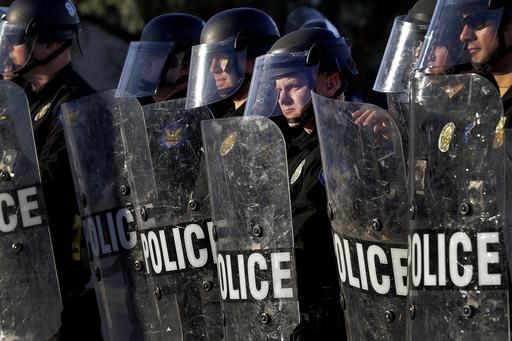PHOENIX (AP) — Phoenix police discriminate against Black, Hispanic and Native American people, unlawfully detain homeless people and use excessive force, including unjustified deadly force, the U.S. Justice Department said Thursday.
A sweeping government investigation uncovered a host of civil rights violations by the police force in the nation’s fifth-largest city. Investigators found stark racial disparities in how police enforce certain laws, like low-level drug and traffic offenses.
The Justice Department found that Phoenix police shoot at people who do not immediately pose a threat, and continue to fire their weapons after any threat has been eliminated. Police also routinely delay medical care for people in encounters and use excessive force on wounded people, officials said.
Phoenix police didn’t immediately respond to the justice department’s report, but referred further questions to the city.
Phoenix Mayor Kate Gallego said in a statement that the city received the findings when the justice department announced the report, and officials will meet June 25 to get legal advice and discuss next steps.
“I will carefully and thoroughly review the findings before making further comment,” she said.
Attorney General Merrick Garland called the release of the report “an important step toward accountability and transparency.”
“We are committed to working with the City of Phoenix and Phoenix Police Department on meaningful reform that protects the civil rights and safety of Phoenix residents and strengthens police-community trust,” he said in an email.
The Justice Department said the police department enforces certain laws — like low-level drug and traffic offenses, loitering and trespassing — more harshly against Black, Hispanic and Native American people than against white people who engaged in the same conduct.
Black people in the city are over 3.5 times more likely than white people, for example, to be cited or arrested for not signaling before turning, the report says. Hispanic drivers are more than 50% more likely than white drivers to be cited or arrested for speeding near school zone cameras. And Native American people were more than 44 times more likely than white people — on a per capita basis — to be cited or arrested for possessing and consuming alcohol.
Officers investigating drug-related offenses also were 27% more likely to release white people in 30 minutes or less, but Native Americans accused of the same offense were detained longer, the department said. And Native Americans were 14% more likely to be booked for trespassing-related offenses, while officers cited or released white people who were stopped for the same offense.
There is “overwhelming statistical evidence” that the disparities are due to discrimination, the Justice Department said.
This is the first time the department has issued findings like this regarding treatment of Native American people and homeless people, said Assistant Attorney General Kristen Clarke, who leads the Justice Department’s Civil Rights Division.
Clarke criticized the city for “over-policing” homeless people, saying officers frequently arrest homeless people without reasonable suspicion that they committed a crime. More than a third of the Phoenix Police Department’s misdemeanor arrests and citations were of homeless people, the report says.
The investigation launched in August 2021. The police force in Phoenix has been criticized for its treatment of protesters in 2020, deaths of people who were restrained by officers, and a high number of shootings by officers. Civil rights advocates had complained that Phoenix police and prosecutors were pursuing gang charges as part of abusive political prosecutions intended to silence dissent and scare protesters.
Litigation is an option if the Justice Departments’ efforts to secure a consent decree — a court-enforced plan for reform — are unsuccessful.
“We remain very hopeful that we can build on the track record of success that we have had in other jurisdictions across our country and put in place a consent decree that contains the strong medicine necessary to address the severe violations identified,” Clarke said.
Similar DOJ investigations, in Albuquerque, Baltimore and elsewhere, have found systemic problems related to excessive force and civil rights violations, some resulting in costly consent decrees that have lasted for years.
In Phoenix, a 2020 case accusing 15 protesters of being in an anti-police gang was dismissed because there wasn’t credible evidence; in 2017, a “challenge coin” was circulated among officers depicting a gas mask-wearing demonstrator getting shot in the groin with a projectile; and in June 2019, cellphone video emerged showing officers pointing guns when they confronted an unarmed Black couple with two small children they suspected of shoplifting.
Poder In Action, a Phoenix advocacy group for people of color and workers, said the findings were no surprise.
“We never needed a DOJ investigation to tell us this,” the group said in a statement. “The data and the stories from residents have been telling us this for years.”
The report said some police shootings likely could have been avoided if not for officers’ “reckless tactics.” And investigators found that police “unreasonably delay” providing aid to people they have shot and use force against people who are unconscious or otherwise incapacitated.
Police in one instance waited more than nine minutes to begin providing aid to a woman who was laying on the ground after officers shot her 10 times, the Justice Department said. The woman died.
The Justice Department zeroed on the city’s 911 operations. Even though the city has invested $15 million to send non-police responders to mental health calls, the city hasn’t given the 911 call-takers and dispatchers necessary training.
Officers assume people with disabilities are dangerous and resort to force rather than de-escalation tactics, leading to force and criminal consequences for those with behavioral health disabilities, rather than finding them care, the Justice Department said.
___
Associated Press journalist Alanna Durkin Richer contributed from Washington, D.C.
This post was originally published on this site




